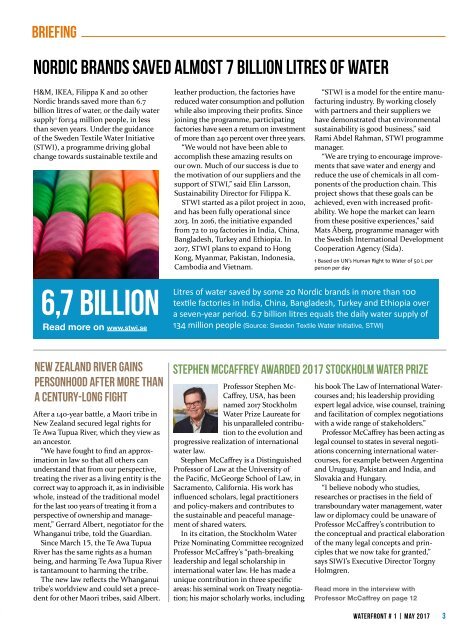WF #1 2017_webb
Create successful ePaper yourself
Turn your PDF publications into a flip-book with our unique Google optimized e-Paper software.
iefing<br />
Nordic brands saved almost 7 billion litres of water<br />
H&M, IKEA, Filippa K and 20 other<br />
Nordic brands saved more than 6.7<br />
billion litres of water, or the daily water<br />
supply 1 for134 million people, in less<br />
than seven years. Under the guidance<br />
of the Sweden Textile Water Initiative<br />
(STWI), a programme driving global<br />
change towards sustainable textile and<br />
leather production, the factories have<br />
reduced water consumption and pollution<br />
while also improving their profits. Since<br />
joining the programme, participating<br />
factories have seen a return on investment<br />
of more than 240 percent over three years.<br />
“We would not have been able to<br />
accomplish these amazing results on<br />
our own. Much of our success is due to<br />
the motivation of our suppliers and the<br />
support of STWI,” said Elin Larsson,<br />
Sustainability Director for Filippa K.<br />
STWI started as a pilot project in 2010,<br />
and has been fully operational since<br />
2013. In 2016, the initiative expanded<br />
from 72 to 119 factories in India, China,<br />
Bangladesh, Turkey and Ethiopia. In<br />
<strong>2017</strong>, STWI plans to expand to Hong<br />
Kong, Myanmar, Pakistan, Indonesia,<br />
Cambodia and Vietnam.<br />
“STWI is a model for the entire manufacturing<br />
industry. By working closely<br />
with partners and their suppliers we<br />
have demonstrated that environmental<br />
sustainability is good business,” said<br />
Rami Abdel Rahman, STWI programme<br />
manager.<br />
“We are trying to encourage improvements<br />
that save water and energy and<br />
reduce the use of chemicals in all components<br />
of the production chain. This<br />
project shows that these goals can be<br />
achieved, even with increased profitability.<br />
We hope the market can learn<br />
from these positive experiences,” said<br />
Mats Åberg, programme manager with<br />
the Swedish International Development<br />
Cooperation Agency (Sida).<br />
1 Based on UN’s Human Right to Water of 50 L per<br />
person per day<br />
6,7 billion<br />
Read more on www.stwi.se<br />
Litres of water saved by some 20 Nordic brands in more than 100<br />
textile factories in India, China, Bangladesh, Turkey and Ethiopia over<br />
a seven-year period. 6.7 billion litres equals the daily water supply of<br />
134 million people (Source: Sweden Textile Water Initiative, STWI)<br />
New Zealand river gains<br />
personhood after more than<br />
a century-long fighT<br />
After a 140-year battle, a Maori tribe in<br />
New Zealand secured legal rights for<br />
Te Awa Tupua River, which they view as<br />
an ancestor.<br />
“We have fought to find an approximation<br />
in law so that all others can<br />
understand that from our perspective,<br />
treating the river as a living entity is the<br />
correct way to approach it, as in indivisible<br />
whole, instead of the traditional model<br />
for the last 100 years of treating it from a<br />
perspective of ownership and management,”<br />
Gerrard Albert, negotiator for the<br />
Whanganui tribe, told the Guardian.<br />
Since March 15, the Te Awa Tupua<br />
River has the same rights as a human<br />
being, and harming Te Awa Tupua River<br />
is tantamount to harming the tribe.<br />
The new law reflects the Whanganui<br />
tribe’s worldview and could set a precedent<br />
for other Maori tribes, said Albert.<br />
Stephen McCaffrey awarded <strong>2017</strong> Stockholm Water Prize<br />
Professor Stephen Mc<br />
Caffrey, USA, has been<br />
named <strong>2017</strong> Stockholm<br />
Water Prize Laureate for<br />
his unparalleled contribution<br />
to the evolution and<br />
progressive realization of international<br />
water law.<br />
Stephen McCaffrey is a Distinguished<br />
Professor of Law at the University of<br />
the Pacific, McGeorge School of Law, in<br />
Sacramento, California. His work has<br />
influenced scholars, legal practitioners<br />
and policy-makers and contributes to<br />
the sustainable and peaceful management<br />
of shared waters.<br />
In its citation, the Stockholm Water<br />
Prize Nominating Committee recognized<br />
Professor McCaffrey’s “path-breaking<br />
leadership and legal scholarship in<br />
international water law. He has made a<br />
unique contribution in three specific<br />
areas: his seminal work on Treaty negotiation;<br />
his major scholarly works, including<br />
his book The Law of International Watercourses<br />
and; his leadership providing<br />
expert legal advice, wise counsel, training<br />
and facilitation of complex negotiations<br />
with a wide range of stakeholders.”<br />
Professor McCaffrey has been acting as<br />
legal counsel to states in several negotiations<br />
concerning international watercourses,<br />
for example between Argentina<br />
and Uruguay, Pakistan and India, and<br />
Slovakia and Hungary.<br />
“I believe nobody who studies,<br />
researches or practises in the field of<br />
transboundary water management, water<br />
law or diplomacy could be unaware of<br />
Professor McCaffrey’s contribution to<br />
the conceptual and practical elaboration<br />
of the many legal concepts and principles<br />
that we now take for granted,”<br />
says SIWI’s Executive Director Torgny<br />
Holmgren.<br />
Read more in the interview with<br />
Professor McCaffrey on page 12<br />
WATERFRONT # 1 | may <strong>2017</strong><br />
3


















